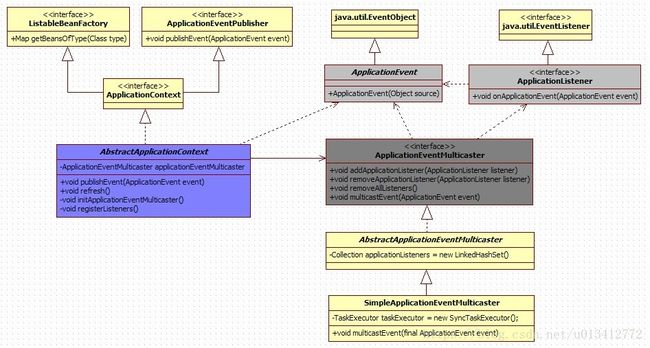Spring源码学习--Spring事件体系
文章来源:
https://blog.csdn.net/caihaijiang/article/details/7460888
Spring事件体系包括三个组件:事件,事件监听器,事件广播器。

事件:ApplicationEvent
事件监听器:ApplicationListener,对监听到的事件进行处理。
事件广播器:ApplicationEventMulticaster,将Springpublish的事件广播给所有的监听器。
Spring在ApplicationContext接口的抽象实现类AbstractApplicationContext中完成了事件体系的搭建。
AbstractApplicationContext拥有一个applicationEventMulticaster成员变量,applicationEventMulticaster提供了容器监听器的注册表。
AbstractApplicationContext在refresh()这个容器启动方法中搭建了事件的基础设施,其中AbstractApplicationContext的refresh方法实现如下:
@Override
public void refresh() throws BeansException, IllegalStateException {
synchronized (this.startupShutdownMonitor) {
// Prepare this context for refreshing.
prepareRefresh();
// Tell the subclass to refresh the internal bean factory.
ConfigurableListableBeanFactory beanFactory = obtainFreshBeanFactory();
// Prepare the bean factory for use in this context.
prepareBeanFactory(beanFactory);
try {
// Allows post-processing of the bean factory in context subclasses.
postProcessBeanFactory(beanFactory);
// Invoke factory processors registered as beans in the context.
invokeBeanFactoryPostProcessors(beanFactory);
// Register bean processors that intercept bean creation.
registerBeanPostProcessors(beanFactory);
// Initialize message source for this context.
initMessageSource();
// Initialize event multicaster for this context.
initApplicationEventMulticaster();
// Initialize other special beans in specific context subclasses.
onRefresh();
// Check for listener beans and register them.
registerListeners();
// Instantiate all remaining (non-lazy-init) singletons.
finishBeanFactoryInitialization(beanFactory);
// Last step: publish corresponding event.
finishRefresh();
}
catch (BeansException ex) {
if (logger.isWarnEnabled()) {
logger.warn("Exception encountered during context initialization - " +
"cancelling refresh attempt: " + ex);
}
// Destroy already created singletons to avoid dangling resources.
destroyBeans();
// Reset 'active' flag.
cancelRefresh(ex);
// Propagate exception to caller.
throw ex;
}
finally {
// Reset common introspection caches in Spring's core, since we
// might not ever need metadata for singleton beans anymore...
resetCommonCaches();
}
}
}1 事件广播器的初始化
/**
* Initialize the ApplicationEventMulticaster.
* Uses SimpleApplicationEventMulticaster if none defined in the context.
* @see org.springframework.context.event.SimpleApplicationEventMulticaster
*/
protected void initApplicationEventMulticaster() {
ConfigurableListableBeanFactory beanFactory = getBeanFactory();
if (beanFactory.containsLocalBean(APPLICATION_EVENT_MULTICASTER_BEAN_NAME)) {
this.applicationEventMulticaster =
beanFactory.getBean(APPLICATION_EVENT_MULTICASTER_BEAN_NAME, ApplicationEventMulticaster.class);
if (logger.isDebugEnabled()) {
logger.debug("Using ApplicationEventMulticaster [" + this.applicationEventMulticaster + "]");
}
}
else {
this.applicationEventMulticaster = new SimpleApplicationEventMulticaster(beanFactory);
beanFactory.registerSingleton(APPLICATION_EVENT_MULTICASTER_BEAN_NAME, this.applicationEventMulticaster);
if (logger.isDebugEnabled()) {
logger.debug("Unable to locate ApplicationEventMulticaster with name '" +
APPLICATION_EVENT_MULTICASTER_BEAN_NAME +
"': using default [" + this.applicationEventMulticaster + "]");
}
}
}用户可以在配置文件中为容器定义一个自定义的事件广播器,只要实现ApplicationEventMulticaster就可以了,Spring会通过 反射的机制将其注册成容器的事件广播器,如果没有找到配置的外部事件广播器,Spring自动使用 SimpleApplicationEventMulticaster作为事件广播器。
2 注册事件监听器
/**
* Add beans that implement ApplicationListener as listeners.
* Doesn't affect other listeners, which can be added without being beans.
*/
protected void registerListeners() {
// Register statically specified listeners first.
for (ApplicationListener listener : getApplicationListeners()) {
getApplicationEventMulticaster().addApplicationListener(listener);
}
// Do not initialize FactoryBeans here: We need to leave all regular beans
// uninitialized to let post-processors apply to them!
String[] listenerBeanNames = getBeanNamesForType(ApplicationListener.class, true, false);
for (String listenerBeanName : listenerBeanNames) {
getApplicationEventMulticaster().addApplicationListenerBean(listenerBeanName);
}
// Publish early application events now that we finally have a multicaster...
Set earlyEventsToProcess = this.earlyApplicationEvents;
this.earlyApplicationEvents = null;
if (earlyEventsToProcess != null) {
for (ApplicationEvent earlyEvent : earlyEventsToProcess) {
getApplicationEventMulticaster().multicastEvent(earlyEvent);
}
}
} Spring根据反射机制,使用ListableBeanFactory的getBeansOfType方法,从BeanDefinitionRegistry中找出所有实现 org.springframework.context.ApplicationListener的Bean,将它们注册为容器的事件监听器,实际的操作就是将其添加到事件广播器所提供的监听器注册表中。
3 发布事件
跟着 finishRefresh();方法进入publishEvent(new ContextRefreshedEvent(this));方法如下:
/**
* Publish the given event to all listeners.
* @param event the event to publish (may be an {@link ApplicationEvent}
* or a payload object to be turned into a {@link PayloadApplicationEvent})
* @param eventType the resolved event type, if known
* @since 4.2
*/
protected void publishEvent(Object event, ResolvableType eventType) {
Assert.notNull(event, "Event must not be null");
if (logger.isTraceEnabled()) {
logger.trace("Publishing event in " + getDisplayName() + ": " + event);
}
// Decorate event as an ApplicationEvent if necessary
ApplicationEvent applicationEvent;
if (event instanceof ApplicationEvent) {
applicationEvent = (ApplicationEvent) event;
}
else {
applicationEvent = new PayloadApplicationEvent在AbstractApplicationContext的publishEvent方法中, Spring委托ApplicationEventMulticaster将事件通知给所有的事件监听器.
4 Spring默认的事件广播器SimpleApplicationEventMulticaster
@Override
public void multicastEvent(final ApplicationEvent event, ResolvableType eventType) {
ResolvableType type = (eventType != null ? eventType : resolveDefaultEventType(event));
for (final ApplicationListener listener : getApplicationListeners(event, type)) {
Executor executor = getTaskExecutor();
if (executor != null) {
executor.execute(new Runnable() {
@Override
public void run() {
invokeListener(listener, event);
}
});
}
else {
invokeListener(listener, event);
}
}
}
/**
* Invoke the given listener with the given event.
* @param listener the ApplicationListener to invoke
* @param event the current event to propagate
* @since 4.1
*/
@SuppressWarnings({"unchecked", "rawtypes"})
protected void invokeListener(ApplicationListener listener, ApplicationEvent event) {
ErrorHandler errorHandler = getErrorHandler();
if (errorHandler != null) {
try {
listener.onApplicationEvent(event);
}
catch (Throwable err) {
errorHandler.handleError(err);
}
}
else {
try {
listener.onApplicationEvent(event);
}
catch (ClassCastException ex) {
// Possibly a lambda-defined listener which we could not resolve the generic event type for
LogFactory.getLog(getClass()).debug("Non-matching event type for listener: " + listener, ex);
}
}
}遍历注册的每个监听器,并启动来调用每个监听器的onApplicationEvent方法。由于SimpleApplicationEventMulticaster的taskExecutor的实现类是SyncTaskExecutor,因此,事件监听器对事件的处理,是同步进行的。
从代码可以看出,applicationContext.publishEvent()方法,需要同步等待各个监听器处理完之后,才返回。
也就是说,Spring提供的事件机制,默认是同步的。如果想用异步的,可以自己实现ApplicationEventMulticaster接口,并在Spring容器中注册id为applicationEventMulticaster的Bean。例如下面所示:
public class AsyncApplicationEventMulticaster extends AbstractApplicationEventMulticaster {
private TaskExecutor taskExecutor = new SimpleAsyncTaskExecutor();
public void setTaskExecutor(TaskExecutor taskExecutor) {
this.taskExecutor = (taskExecutor != null ? taskExecutor : new SimpleAsyncTaskExecutor());
}
protected TaskExecutor getTaskExecutor() {
return this.taskExecutor;
}
@SuppressWarnings("unchecked")
public void multicastEvent(final ApplicationEvent event) {
for (Iterator it = getApplicationListeners().iterator(); it.hasNext();) {
final ApplicationListener listener = it.next();
getTaskExecutor().execute(new Runnable() {
public void run() {
listener.onApplicationEvent(event);
}
});
}
}
} spring配置:
id="applicationEventMulticaster"
class="com.alibaba.chj.event.AsyncApplicationEventMulticaster" /> Spring发布事件之后,所有注册的事件监听器,都会收到该事件,因此,事件监听器在处理事件时,需要先判断该事件是否是自己关心的。
Sping事件体系所使用的设计模式是:观察者模式。ApplicationListener是观察者接口,接口中定义了onApplicationEvent方法,该方法的作用是对ApplicationEvent事件进行处理。